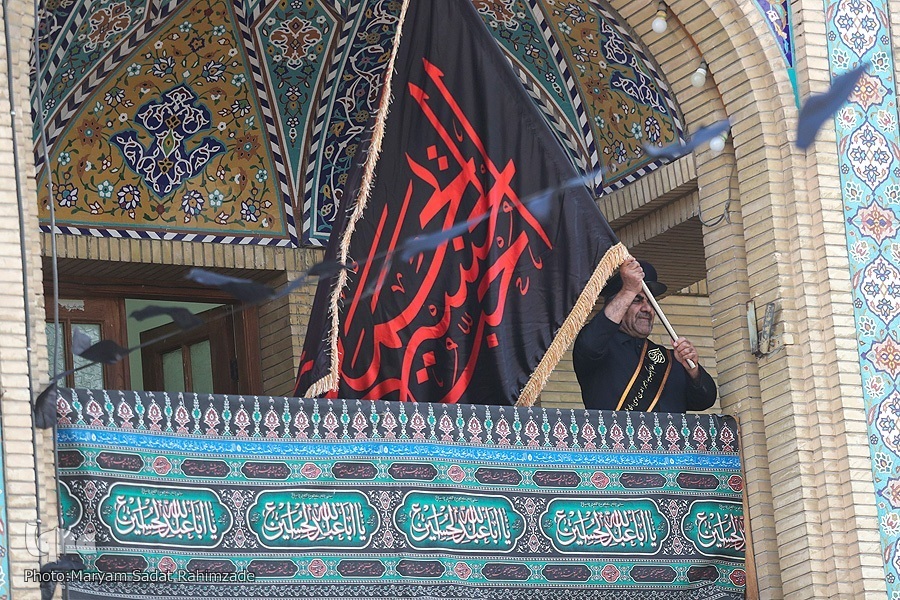Essence of Imam Hussein's Movement: Enjoining Good, Forbidding Evil

This is according to the late Iranian scholar Ayatollah Morteza Motahari who discussed the issue in his book “Hamaseh Husseini” [Husseini epic].
A substantial body of research has delved into the underlying reasons behind the Ashura uprising, with each perspective being influenced by individual beliefs. Some argue that the central aim of Imam Hussain's movement was to establish an Islamic government, while others suggest he had a directive.
By referring to Imam Hussain's own words, a clearer insight emerges. Within his expressions, one can discern intentions that revolved around reforming the Muslim community, promoting righteousness, denouncing wickedness, and addressing numerous fundamental concerns.
Historical context also entailed factors such as Yazid's demand for the Imam’s allegiance to him and the Kufis' declaration of allegiance to the Imam. However, when dissecting the Ashura incident, it is vital to differentiate between these factors in terms of their significance and impact, Motahari argues.
In his analysis of the Karbala incident, the martyred author delineates the role and importance of the various contributing elements:
Key factors in the Husseini movement
Hosseini's movement was a complex tapestry woven from various intricate factors, contributing to the intricate nature of its interpretation and comprehension. The pivotal factors influencing this movement can be summarized as follows:
A) Refusal of Allegiance to Yazid and its Implications
Pledging allegiance to Yazid, who was the symbol of corruption, entailed two corruptive facets:
- Solidification of hereditary rule within the Umayyad dynasty, shifting the discourse from individual-based leadership to the establishment of a dynastic caliphate. This is because of Muawiya's resolute intent for his son, Yazid, to ascend to the position of Caliph.
- Distinctive attributes of Yazid himself, setting his time apart from preceding eras. He was not only corrupt but also unlike his Umayyad predecessors, openly disregarded Islamic principles and moral values, unabashedly indulging in behaviors such as public consumption of alcohol. And Imam Hussein (AS) says such allegiance would mean “Then bid farewell to Islam for the nation has been afflicted with a shepherd like Yazid.”
Imam Hussain's refusal of allegiance serves as a resounding statement that he disavowed any obligation to such a government. His refusal posed a challenge to the existing authority, wherein the Imam's duty was to reject submission, even if met with fatal consequences. Yazid, in a private correspondence, asks for allegiance but Imam Hussein (AS) says: “By Allah, I shall not give my oath to you like a humiliated one, and nor shall I flee like the captive.”
B) Invitation from people of Kufa
The calls from the people of Kufa wasn't the primary driving force and it only could have led to the Imam’s departure from Mecca toward Kufa. The letters from Kufa didn't reach Medina; instead, they were delivered to the Imam in Mecca, but the Imam had already begun his movement from Medina. This means that by the time he received these letters, he had already decided to decline allegiance, a decision that put him in considerable danger. As a result, the people of Kufa inviting him wasn't the central catalyst for this movement but rather a secondary element.
C) Enjoining good and forbidding evil
As Imam Hussein (AS) departed Medina, he explicitly conveyed his will to Muhammad bin Hanafiyah:
“I have not risen to spread evil or to show off, nor for spreading immorality or oppression. But I have risen for the betterment of the ummah of my grandfather and I desire to propagate the religion and forbid evil, thus following the footsteps of my grandfather and my father Ali bin Abi Talib (AS).”
At this juncture, the focus shifted away from allegiance and the people of Kufa. In essence, the Imam would not stand idle even if not called upon to pledge allegiance. This aspect, as emphasized by Imam Hussain, stands as a distinct principle and fundamental motivation.
Evaluation of the mentioned factors
Among the factors delineated, the invitation from the people of Kufa holds a relatively straightforward and ordinary value. Its potential for success is not high, contingent on the relative strength of the opposing forces; the greater their numbers, the lower the odds of success, Motahari notes.
Regarding allegiance, its significance surpasses that of the invitation. The absence of support and the people's reluctance to pledge allegiance underscore the Imam's resolve. In this scenario, he confronts a formidable power alone, devoid of allies or reinforcement. His resistance holds inherent value.
However, the highest value is attributed to the principle of enjoining good and forbidding evil as it does not rely on invitation or call for allegiance, Motahari said, adding, if only the first factor held sway, the Imam's movement would not have materialized without the Kufans' invitation. Similarly, had the second factor reigned supreme, absent the government's allegiance demand, the Imam would not have risen. Yet, according to the third factor, Imam Hussein (AS) is a critic and revolutionary.
Hussein (AS) emerges as a protestor, critic, revolutionary, and positive force. No other motivations are needed; pervasive corruption, the distortion of right and wrong, misappropriation of Muslim resources for ungodly purposes, all these ills have engulfed society. Prophet Muhammad (PBUH) said whoever encounters such circumstances and does not move to change it or protest against it, will have the same destination and fate as those of oppressors.
Translated by Mohammad Ali Haqshenas
This represents a segment within a series of five articles that try to encapsulate the essence of Ayatollah Morteza Motahari's work, "Hamaseh Husseini." For more insight, readers are invited to engage with the entire series through the following accessible links: Part 1, Part 2, Part 3, Part 4, and Part 5.



